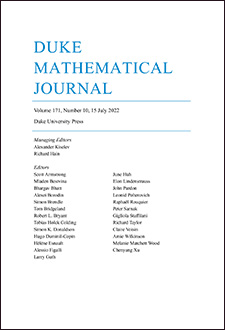Abstract
For a nondegenerate integral quadratic form in variables, we prove an optimal strong approximation theorem. Let be a fixed compact subset of the affine quadric over the real numbers. Take a small ball of radius inside , and an integer . Further assume that is a given integer which satisfies for any . Finally assume that an integral vector mod is given. Then we show that there exists an integral solution of such that and , provided that all the local conditions are satisfied. We also show that is the best possible exponent. Moreover, for a nondegenerate integral quadratic form in four variables, we prove the same result if is odd and . Based on our numerical experiments on the diameter of LPS Ramanujan graphs and the expected square-root cancellation in a particular sum that appears in Remark 6.8, we conjecture that the theorem holds for any quadratic form in four variables with the optimal exponent .
Citation
Naser T. Sardari. "Optimal strong approximation for quadratic forms." Duke Math. J. 168 (10) 1887 - 1927, 15 July 2019. https://doi.org/10.1215/00127094-2019-0007
Information





